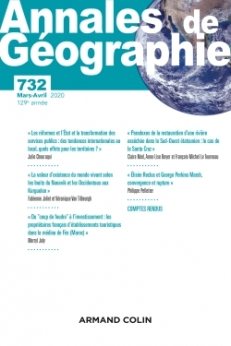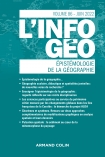
Annales de géographie - N° 732 (2/2020)
Pour acheter ce numéro, contactez-nous
Recevez les numéros de l'année en cours et accédez à l'intégralité des articles en ligne.
Héritiers de la Naturphilosophie allemande, Élisée Reclus (1830-1905) et George Perkins Marsh (1801-1882), qui échangent une correspondance, dénoncent, au milieu du XIXe siècle, les destructions anthropiques de certains milieux. Mais leur conception du rapport nature-société diverge par la suite. Leur correspondance s’arrête. La position du géographe anarchiste Reclus et celle de l’ambassadeur Marsh, whig et calviniste puritain, sont incompatibles. La vision métaphysique de la nature chez Marsh, qui s’affirme dans les éditions successives de son Man and Nature après 1864 ne correspond plus à l’éthique laïque et à l’esthétique pratique de Reclus. Tous les deux et partagent une conception utilitariste de la nature, tant dans l’exploitation de ses ressources que dans le bénéfice de sa contemplation. Mais l’anthropocentrisme de Marsh s’arrête à la supériorité attribuée à Dieu. Dans le cadre d’un anarchisme social désireux que le progrès profite à tous, Reclus combine protection des paysages, respect pour les espèces animales ou végétales, et aménagement raisonné de l’espace.
Heirs of the German Naturphilosophie, Élisée Reclus (1830-1905) and George Perkins Marsh (1801-1882), who exchanged letters and cited each other’s publications. In the mid XIXth Century they denounced the destruction of nature caused by human activities. However, their conceptions about the relationship between nature and society soon diverged. Their correspondence (1868-1871) stopped. An incompatibility emerged between the anarchist Reclus and the ambassador Marsh, Whig and Calvinist puritan. The metaphysical vision of nature held by Marsh, developing steadily in the successive editions of his Man and Nature after 1864, did not fit in with the secular ethics and practical aesthetic of Reclus. Both men shared a commonutilitarian concept of nature (to use nature for its resources and for contemplation). But the anthropocentrism of Marsh does not go beyond the superiority accorded to God. Within his social anarchism, that promoted a sharing of the benefits coming fromprogress towards all people, Reclus combined protection of landscape, respect for animal or plant species, and rationalized management of space and environments. Marsh, supporter of the State, which is the transcendental political form corresponding to monotheist religion symbolized by Calvinist puritanism, can be praised by present green parties, but not Reclus who is atheist, non-statist and supporter of social revolution.

